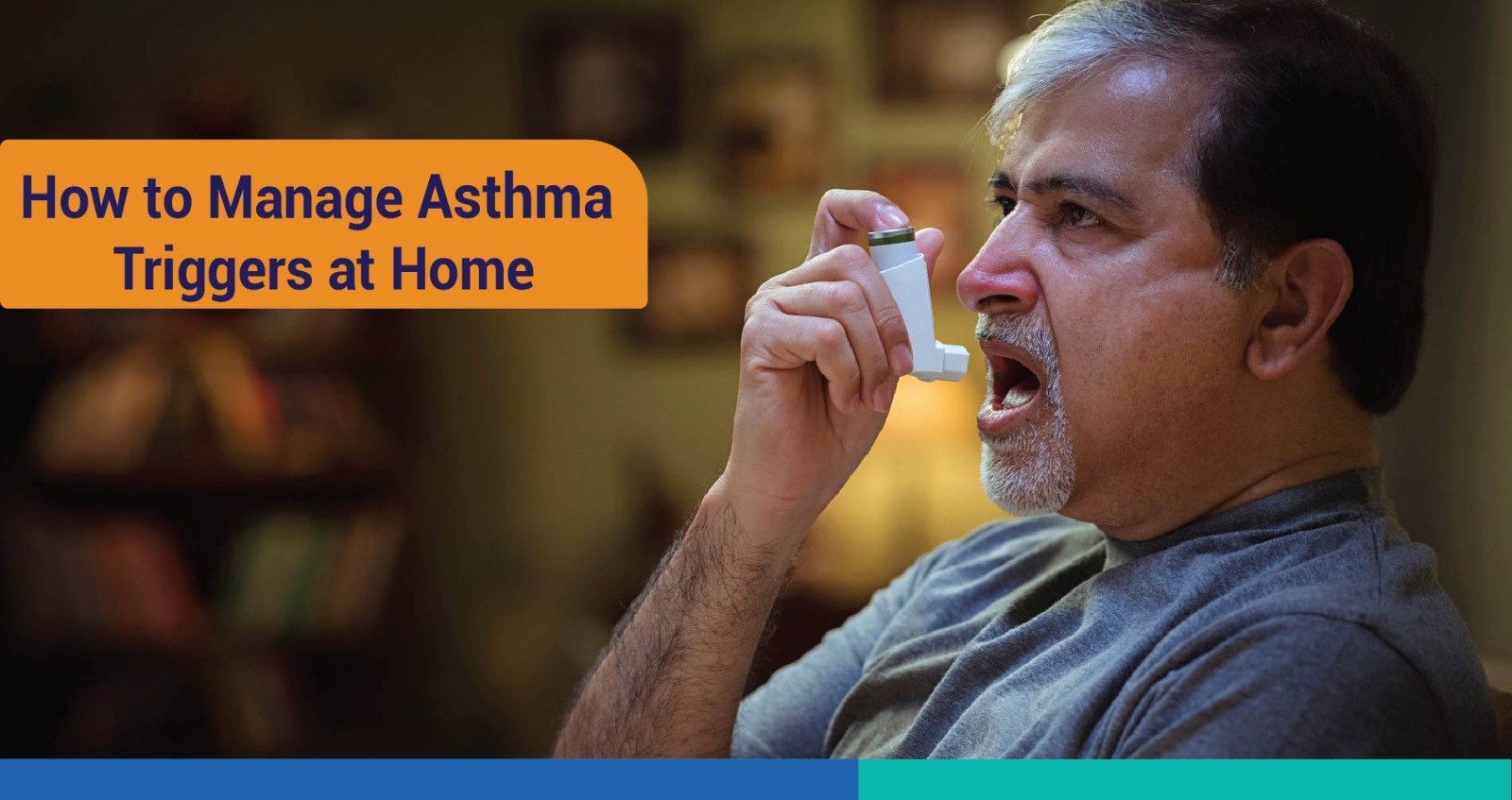Toll Free Helpline Number
18002101616
Book on Whatsapp
9892101616
What Are The Tests To Confirm Asthma
Asthma
Sat Sep 23 2023
Asthma is a reactive airway abnormality causing difficulty in breathing, chest tightness, coughing and wheezing. It is caused by the hypersensitivity manifestation of the body that causes the elevation of the immunoglobulin type E to protect the body's reactions.
A common type of diagnostic procedure for asthma includes a lung function examination, Blood Test, and Chest x-ray. Sometimes there are more lucid ways to rule out some other causative agents that may have caused the symptoms.
1. Chest x-ray and CT Scan:
It does not diagnose any abnormalities due to asthma. It is to obtain images using radiation of the internal organs to visualize if other causes exist. It generally is used to determine any broken bone or severe bronchitis.
2. Blood test:
A Blood Test is sometimes used by doctors to measure the level of IgE immunoglobulin, which can be elevated during asthma test.
3. Lungs function examination:
It is a common test to evaluate the presence of any abnormality. The Lung function test includes spirometry. It monitors the breathing rate tested by determining the pace of the inhaled & exhaled air. In this method, the doctor gives a bronchodilator to see the changes.
It clarifies whether your windpipe has any obstructions. Another type of test is the methacholine challenge examination which convincingly screens the presence of symptoms due to asthma.
5. Exhaling Nitric acid:
Nitric acid is an inflammatory indicator that can be given to the patient by a handheld instrument and the exhaled amount of nitric acid is calculated.
Thus, once the cause of the symptoms is clear the patient is oriented towards proper treatment.
Laboratory Test for Asthma
Allergy Testing: To identify specific allergens that can trigger asthma symptoms.
Immunoglobulin E (IgE): Assessing IgE levels to understand allergic responses associated with asthma.
Absolute Eosinophil Count (AEC): Evaluating AEC to gauge airway inflammation.
These diagnostic tools are instrumental in tailoring effective treatment strategies for individuals with asthma, enabling healthcare professionals to offer personalized care and improved asthma management.
Conclusion:
Confirming asthma involves a combination of clinical evaluation and diagnostic tests. The results of these tests help healthcare professionals tailor treatment plans to manage symptoms effectively. If you suspect you have asthma or are experiencing respiratory symptoms, consult with a healthcare provider who can guide you through the diagnostic process and develop a personalized approach to managing your condition. Early and accurate diagnosis is key to living a full and active life with asthma.
Related Blogs

Asthma
Living with Asthma: Overcoming Challenges and Embracing Life
Asthma, a chronic respiratory condition characterized by airway hyperreactivity. It can significantly impact an individual's quality of life. However, with a comprehensive management plan and a proactive patient approach, you can achieve excellent asthma control. With early screening of good health packages, living a fulfilling life is absolutely achievable.
Asthma Pathophysiology: Airway Hyperreactivity and Triggers
The core issue in asthma lies in bronchial hyperreactivity. The bronchi is the airways within the lungs. It becomes hypersensitive to specific triggers. This leads to inflammation and constriction. Common triggers include allergens (dust mites, pollen), irritants (smoke, pollution), and exercise-induced bronchoconstriction (EIB) in some cases.
Developing a Personalized Management Plan: Collaboration is Essential
The core of effective asthma management is a collaborative action plan. You can speak to your doctor and formulate it with your healthcare provider. You will need screening of health care packages to assess the cause! This plan, a roadmap to optimal respiratory health, outlines key strategies:
Trigger Identification: A detailed medical history and potentially diagnostic testing is needed. Search for 'Manipal TRUtest near me' and get yourself tested at your nearest location! Your physician will meticulously identify the specific triggers that exacerbate your asthma. This helps you to implement preventative measures, such as allergen avoidance or pre-exercise bronchodilator use.
Daily Controller Medications: Inhaled corticosteroids (ICS) are often the mainstay of controller therapy. These medications are administered daily. It acts proactively to reduce airway inflammation and prevent asthma attacks. They function as your preventative defense system, ensuring optimal baseline lung function.
Quick-Relief Inhalers: These inhalers, typically containing short-acting beta-agonists (SABAs), serve as your rapid response team. They provide fast-acting relief during an asthma attack. The inhalers relax the airways and facilitate easier breathing.
Optimizing Your Lifestyle for Improved Lung Function
Medications play a vital role in asthma control. Also, a healthy lifestyle significantly enhances management:
Regular Physical Activity
Engaging in regular exercise strengthens your lungs and overall health. However, activity selection is crucial. Discuss an exercise plan with your physician to choose activities you enjoy. Listen to your body, warm up properly, and manage any difficulties that may arise.
Environmental Control
Dust mites thrive in cluttered environments. Address this by regularly washing bedding in hot water. Vacuum frequently with a HEPA filter, and minimize clutter. If pollen is a trigger, monitor pollen counts. Stay indoors during peak periods.
Smoking Cessation
Smoking is highly detrimental to lung health. It significantly worsens asthma control. If you smoke, quitting is one of the most impactful actions you can take for your respiratory health. Your physician can provide resources and support to help you quit smoking.
Building a Strong Physician-Patient Partnership
Regular consultations with your healthcare provider are very important. These visits enable your doctor to monitor your asthma control. Adjust your action plan as needed based on peak flow meter readings or lung function tests. Address any concerns you may have. Remember, your doctor is your partner in achieving optimal lung health.
Understanding Medical Terminology
During your asthma management journey, you might encounter terms like "routine blood tests" or "chest X-rays." These are simply diagnostic tools used by your physician to assess your overall health. It helps them potentially tailor your asthma treatment plan.
Breathe with Confidence
Adequate knowledge is essential for an asthma victim. Collaborating with your doctor to develop a personalized action plan is the top priority. Implement good lifestyle modifications. This way you can effectively manage your asthma. Don't let asthma dictate your life. Take control, build an active lifestyle, and breathe with confidence!

Asthma
Morning walks during winters can be trigger ASTHMA. Here's why?
During winters, several factors contribute to triggering asthma symptoms during morning walks. Here are a few reasons why this may occur:
1. Cold air: Cold air can irritate the airways and trigger asthma symptoms. When you breathe in cold air, it can cause the airways to constrict and become inflamed, leading to coughing, wheezing, and difficulty breathing.
2. Dry air: Winter air tends to be drier, which can result in dehydration of the airways. This can lead to increased sensitivity and inflammation in individuals with asthma, making them more prone to asthma attacks during morning walks.
3. Indoor allergens: People spend more time indoors during winters, which can expose them to indoor allergens like dust mites, pet dander, and mold. These allergens can trigger asthma symptoms and make individuals more susceptible to attacks during or after their morning walks.
4. Respiratory infections: Winter is commonly associated with colds, flu, and other respiratory infections. These illnesses can exacerbate asthma symptoms and make the airways more sensitive. Engaging in physical activity during a respiratory infection, such as morning walks, may further stress the airways and increase the risk of an asthma attack.
5. Exercise-induced asthma: Some individuals with asthma experience symptoms triggered specifically by exercise. This is known as exercise-induced asthma. Cold weather exercise, like morning walks, can further amplify exercise-induced asthma symptoms.
To minimize the risk of asthma attacks during winter morning walks, it is important to take necessary precautions. Here are a few tips:
1. Cover your nose and mouth with a scarf or mask to help warm the air before breathing it in.
2. Consider using a bronchodilator inhaler before heading out for a walk if prescribed by your doctor.
3. Opt for indoor physical activities on extremely cold or windy days.
4. Keep your indoor living spaces clean and free of allergens.
5. Maintain good hand hygiene and take precautions to prevent respiratory infections during the winter months.
6. Work with your healthcare provider to develop a comprehensive asthma management plan that includes strategies to address winter triggers.
Remember, everyone's asthma triggers may vary, so it is essential to consult with your doctor for personalized advice and recommendations.
Manipal TRUtest offers a wide range of diagnostic services with assured quality, accuracy, and trust backed by 70 years of Manipal legacy. You can easily schedule a blood test through our WhatsApp Chatbot, Mobile App, or Website. We also provide the convenience of a Home Sample Collection, where a highly qualified phlebotomist will visit you in the comfort of your home.
OUR PRESENCE
Blood Test Centre in India
Blood Test Center in Hyderabad / Blood Test Center in Kolkata / Blood Test Center in Vizag / Blood Test Center in Mumbai / Blood Test Center in Ghatkopar / Blood Test Center in Kolhapur / Blood Test Center in Pune / Blood Test Center in Solapur / Blood Test Center in Rohtak / Blood Test Center in Indore / Blood Test Center in Gurugram / Blood Test Center in Ghaziabad/ Blood Test Center in Bangalore / Blood Test Center in Nashik / Blood Test Center in Nagpur
CT-Scan Centres in India
CT Scan Centre in Bhiwani/ CT Scan Centre in Gurugram/ CT Scan Centre in Jind / CT Scan Centre in Hisar/ CT Scan Centre in Kaithal/ CT Scan Centre in Kurukshetra / CT Scan Centre in Mewat/ CT Scan Centre in Sonipat/ CT Scan Centre in Panchkula/ CT Scan Centre in Panipat / CT Scan Centre in Rohtak/ CT Scan Centre in Yamunanagar/ CT Scan Centre in Daltonganj / CT Scan Centre in Deoghar/ CT Scan Centre in Dhanbad / CT Scan Centre in Dumka/ CT Scan Centre in Hazaribagh/ CT Scan Centre in Koderma/ CT Scan Centre in Ranchi/ CT Scan Centre in Simdega/ CT Scan Centre in Bangalore/ CT Scan Centre in Mangaluru / CT Scan Centre in Manipal / CT Scan Centre in Ghatkopar
PET-CT Scan Centres in India
PET- CT Scan Centre in Vijayawada / PET-CT Scan Centre in Manipal / PET-CT Scan Centre in Jaipur / PET-CT Scan Centre in Kanchipuram / PET-CT Scan Centre in Goa
Ultrasound Centres in India
Ultrasound Scan in Deoghar / Ultrasound Scan in Dumka / Ultrasound Scan in Bokaro Steel City / Ultrasound Scan in Chaibasa / Ultrasound Scan in Giridih / Ultrasound Scan in Godda / Ultrasound Scan in Gumla / Ultrasound Scan in Khunti /Ultrasound Scan in Jamtara / Ultrasound Scan in Pakur / Ultrasound Scan in Simdega / Ultrasound Scan in Manipal / Ultrasound Scan in Ghatkopar East / Ultrasound Scan in Garhwa / Ultrasound Scan in Jamshedpur
MRI Scan Centres in India
MRI Scan in Bhiwani / MRI Scan in Gurugram / MRI Scan in Hisar / MRI Scan in Mewat / MRI Scan in Panchkula / MRI Scan in Rohtak / MRI Scan in Sonipat / MRI Scan in Ranchi / MRI Scan in Bangalore / MRI Scan in Bhubaneswar / MRI Scan in Cuttack
X-Ray Centres in India
X-Ray Centres in Chaibasa / X-Ray Centres in Chatra / X-Ray Centres in Deoghar / X-Ray Centres in Dumka / X-Ray Centres in Garhwa / X-Ray Centres in Giridih / X-Ray Centres in Godda / X-Ray Centres in Gumla / X-Ray Centres in Jamshedpur / X-Ray Centres in Jamtara / X-Ray Centres in Khunti / X-Ray Centres in Latehar / X-Ray Centres in Pakur / X-Ray Centres in Ramgarh / X-Ray Centres in Sahibganj / X-Ray Centres in Simdega / X-Ray Centres in Ghatkopar
ECG Centres in India
ECG Test in Bokaro Steel City / ECG Test in BChatra / ECG Test in Deoghar / ECG Test in Dumka / ECG Test in Garhwa / ECG Test in Giridih / ECG Test in Gumla / ECG Test in Jamshedpur / ECG Test in Jamtara / ECG Test in Khunti / ECG Test in Ramgarh / ECG Test in Simdega / ECG Test in Ghatkopar

Asthma
How to Manage Asthma Triggers at Home
Living with asthma can be challenging, but with proper management techniques, individuals can lead full and active lives. One crucial aspect of managing asthma is taking steps to minimize exposure to triggers that can exacerbate symptoms. If you want to know What Are The Tests To Confirm Asthma then here they are: blood tests for asthma such as cbc whole blood EDTA test, pef test, While it's impossible to completely eliminate these triggers, making changes within your home environment can significantly reduce the risk of asthma attacks. Here, we are shedding light on effective strategies for managing asthma triggers at home.
1. Identify Common Asthma Triggers:
The first step in managing asthma triggers is understanding what affects your symptoms. Common triggers include allergens like pollen, dust mites, pet dander, and mold. Other triggers might include irritants such as tobacco smoke, strong odors, cleaning products, and air pollution. By identifying specific triggers, you can target your efforts toward minimizing their presence in your home.
2. Maintain a Clean and Dust-Free Environment:
Regular cleaning of your home is essential to keep asthma triggers at bay. Vacuum carpets and upholstery frequently use a vacuum cleaner with a HEPA filter to trap allergens. Clean surfaces with a damp cloth to prevent dust from becoming airborne. Pay extra attention to bedrooms, where dust mites can thrive. Use allergen-proof covers for pillows, mattresses, and box springs to minimize exposure.
3. Control Humidity Levels:
Excess humidity can promote mold growth, a common trigger for asthma symptoms. Use a dehumidifier to control indoor humidity levels, aiming for a range of 30-50%. Fixing any water leaks promptly and improving ventilation in areas prone to moisture, such as bathrooms and kitchens, can also help reduce mold growth.
4. Manage Pet Allergens:
If you have asthma and are allergic to pets, it may be necessary to find them a new home. However, if you're committed to keeping them, establish pet-free zones, such as bedrooms or certain areas of the house. Regularly grooming and bathing pets can also reduce the amount of allergenic dander in the environment.
5. Improve Indoor Air Quality:
Indoor air pollution can be harmful to individuals with asthma. To improve air quality, ensure proper ventilation throughout your home. Avoid using strong-smelling cleaning products, pesticides, and aerosols. Opt for natural alternatives when possible. Consider investing in an air purifier with a HEPA filter to remove airborne allergens and irritants.
6. Create a Smoke-Free Environment:
Tobacco smoke is one of the most significant asthma triggers. Avoid smoking inside your home, and encourage visitors to do the same. If you or someone in your household smokes, consider quitting or designating an outdoor smoking area away from open windows and doors.
7. Take Precautions with Respiratory Infections:
Respiratory infections, such as the common cold or flu, can worsen asthma symptoms. Practice proper hygiene by washing hands frequently, avoiding close contact with sick individuals, and getting vaccinated to reduce the risk of infections.
Managing asthma triggers at home is crucial for maintaining optimal respiratory health and minimizing the risk of asthma attacks. By implementing these strategies, individuals can create a cleaner and safer environment, thereby reducing their exposure to triggers. However, remember that every asthmatic is unique, and it's important to work with healthcare professionals to tailor a management plan that is suitable for your specific needs. With these measures in place, individuals can take control of their asthma and improve their overall quality of life.
Manipal TRUtest provides comprehensive diagnostic services with assured quality, accuracy, and trust backed by 70 years of Manipal legacy. You can choose our Inhalation Allergy panel which offers detection of 33 allergens. Get Home Sample Collection and a well-qualified phlebotomist shall visit you at the comfort of your home.
